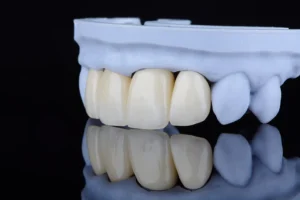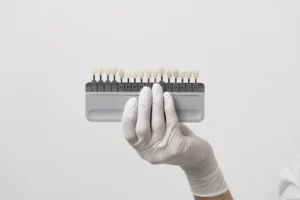Table of Contents
Maintaining a healthy smile goes beyond just having bright, white teeth. The foundation of oral health is dental hygiene, a practice that not only ensures the cleanliness of your teeth and gums but also contributes to your overall health. Many people underestimate the importance of dental hygiene, but it plays a crucial role in preventing serious dental issues like cavities, gum disease, and even tooth loss.
At Billings West Dental, we are dedicated to helping our patients understand the significance of dental hygiene and providing them with the tools and knowledge they need to maintain a beautiful, healthy smile.
What is Dental Hygiene?
Dental hygiene refers to the practice of keeping your teeth, gums, and mouth clean and healthy to prevent dental issues like cavities, gum disease, and bad breath. It includes daily habits such as brushing, flossing, and regular dental check-ups, as well as making smart lifestyle choices that support oral health.
The key goals of dental hygiene are to remove plaque (a sticky film of bacteria) from your teeth, prevent the buildup of tartar (hardened plaque), and keep your gums healthy. A solid dental hygiene routine also protects against more serious oral health issues that could result in pain, infection, or even the loss of teeth.
Why is Dental Hygiene Important?
Dental hygiene is about more than just maintaining a pleasant smile. It is the cornerstone of overall oral health, impacting everything from your breath to your ability to chew and speak comfortably. Here’s why it matters:
Prevents Cavities and Tooth Decay
Tooth decay is one of the most common dental problems. Plaque builds up on your teeth and, when left untreated, produces acids that erode the enamel (the outer protective layer of your teeth). Over time, this can lead to cavities. Brushing and flossing daily removes plaque and reduces the risk of tooth decay.
Protects Against Gum Disease
Gum disease, also known as periodontal disease, begins with gingivitis (inflammation of the gums) and can progress to a more serious condition where the gums pull away from the teeth, leading to tooth loss. Regular dental hygiene practices, including professional cleanings, help prevent the development of gum disease.
Helps Maintain Fresh Breath
Bad breath, or halitosis, is often caused by the buildup of bacteria in the mouth. Good dental hygiene, including brushing, flossing, and tongue cleaning, can keep your breath fresh by removing these bacteria and food particles that contribute to unpleasant odors.
Supports Overall Health
Your oral health is closely linked to your overall health. Poor dental hygiene has been linked to several systemic conditions, including heart disease, diabetes, and respiratory infections. Bacteria from the mouth can enter the bloodstream, potentially contributing to these health issues. Keeping your teeth and gums healthy is an important part of maintaining your overall health.
How Can I Take Care of My Teeth?
Maintaining a healthy smile requires a combination of at-home care and regular visits to your dentist. So, how can I take care of my teeth effectively? Here are some essential steps to ensure optimal dental hygiene:
Brush Your Teeth Twice a Day
Brushing your teeth is the cornerstone of any dental hygiene routine. To ensure you’re brushing effectively:
- Use a soft-bristled toothbrush and fluoride toothpaste.
- Brush for at least two minutes, twice a day.
- Hold your toothbrush at a 45-degree angle to your gums and use gentle circular motions to clean all surfaces of your teeth, including the front, back, and chewing surfaces.
- Don’t forget to brush your tongue to remove bacteria and freshen your breath.
Electric toothbrushes can be an excellent tool for enhancing your brushing technique, as they often come with timers and can provide a more thorough clean than manual brushes.
Floss Daily
Many people skip flossing, but it is just as important as brushing. Flossing removes food particles and plaque from between your teeth and along the gumline, where your toothbrush can’t reach. Here’s how to floss properly:
- Use about 18 inches of floss and wind most of it around your middle fingers, leaving about 1-2 inches of floss to work with.
- Gently slide the floss between your teeth and curve it around each tooth in a C-shape.
- Move the floss up and down to remove plaque and debris from the sides of each tooth.
If traditional flossing is difficult for you, consider using floss picks or water flossers to make the process easier.
Use Mouthwash
Mouthwash can be a great addition to your dental hygiene routine. It helps reduce plaque, freshen breath, and eliminate bacteria. Choose a mouthwash that contains fluoride for added protection against cavities. Swish the mouthwash around your mouth for about 30 seconds after brushing and flossing.
Eat a Balanced Diet
The foods you eat have a direct impact on your oral health. A diet rich in fruits, vegetables, whole grains, lean proteins, and dairy products can help keep your teeth and gums healthy. Limit sugary snacks and drinks, as sugar feeds the bacteria in your mouth that cause tooth decay and gum disease.
Calcium-rich foods like milk, cheese, and yogurt help strengthen tooth enamel, while crunchy fruits and vegetables like apples and carrots can help clean your teeth and stimulate saliva production, which naturally protects against cavities.
Stay Hydrated
Drinking water is not only good for your overall health but also benefits your oral health. Water helps wash away food particles and bacteria, and staying hydrated ensures that your mouth produces enough saliva. Saliva is important because it neutralizes acids in the mouth, protects against tooth decay, and helps heal soft tissue.
Schedule Regular Dental Check-Ups
Even if you follow the best dental hygiene practices at home, it’s still essential to visit our dentist regularly. At Billings West Dental, we recommend visiting us every six months for a professional cleaning and check-up. During these visits, your dentist will:
- Perform a thorough cleaning to remove plaque and tartar buildup.
- Check for signs of cavities, gum disease, and other oral health issues.
- Take X-rays if needed to detect problems below the surface.
- Conduct an oral cancer screening.
Regular dental visits allow our dentist to catch any potential problems early, saving you time, money, and discomfort in the long run.
Avoid Tobacco Products
Smoking and using other tobacco products are major risk factors for gum disease, tooth decay, and oral cancer. If you smoke or use tobacco, quitting is one of the best things you can do for your oral health (and your overall health).
Replace Your Toothbrush Regularly
To maintain effective dental hygiene, replace your toothbrush (or toothbrush head if you use an electric one) every three to four months or sooner if the bristles become frayed. A worn-out toothbrush won’t clean your teeth as effectively.
Common Dental Hygiene Mistakes to Avoid
Now that you know how to take care of your teeth, it’s also important to avoid these common mistakes that can undermine your efforts:
- Brushing too hard: Using excessive force when brushing can wear down your enamel and irritate your gums. Use gentle, circular motions instead.
- Skipping flossing: As mentioned earlier, flossing is crucial for cleaning the areas your toothbrush can’t reach.
- Not brushing long enough: Make sure you’re brushing for a full two minutes each time.
- Using a hard-bristled toothbrush: A soft-bristled toothbrush is best for removing plaque without damaging your enamel or gums.
- Forgetting to brush your tongue: Bacteria can build up on your tongue and contribute to bad breath, so make tongue cleaning a regular part of your routine.
Conclusion
Dental hygiene is the foundation of a healthy smile and plays a vital role in preventing tooth decay, gum disease, and other oral health problems. By brushing and flossing daily, eating a balanced diet, staying hydrated, and visiting Billings West Dental regularly, you can maintain excellent oral health and keep your teeth strong and beautiful for years to come.
At Billings West Dental, we’re here to support you in your journey toward optimal oral health. Whether you need routine cleanings, check-ups, or more advanced dental care, our experienced team is dedicated to helping you achieve and maintain a healthy, radiant smile. If you have any questions about dental hygiene don’t hesitate to reach out to us. We’re always happy to help!



